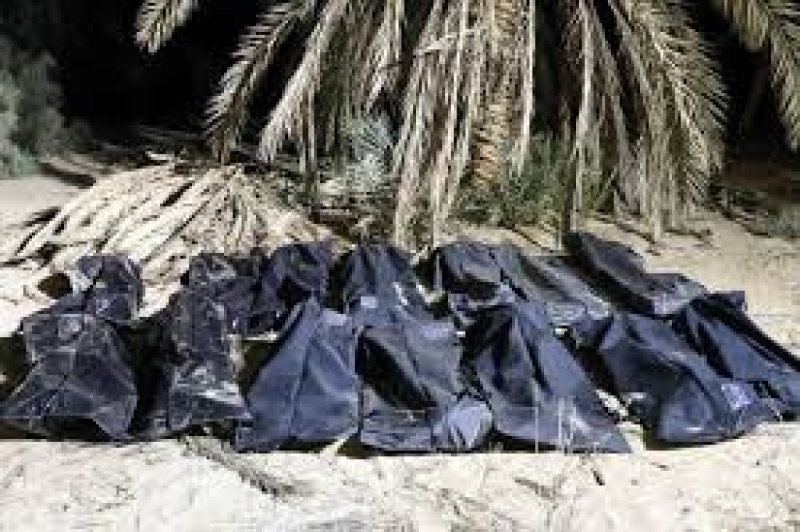- Power generation at Payra Thermal Power Plant 1st unit starts after a month |
- Irregularities, injustice will no longer be accepted in politics: Jamaat Ameer |
- 2 arrested in Jhenaidah for allegedly selling madrasa student |
- Koko’s wife campaigns for Tarique in Dhaka-17 |
- Bangladeshi Expats Cast 4.58 Lakh Postal Votes |
Nearly 50 Migrant Bodies Found in Southeastern Libya Graves

Libyan authorities have uncovered nearly 50 bodies in two separate mass graves in the country’s southeastern desert, adding to the growing tragedy of migrant deaths amid the ongoing instability in the region. The discoveries, reported on Sunday, are a stark reminder of the deadly risks faced by those attempting to cross Libya in their desperate bid to reach Europe.
The first grave, containing 19 bodies, was uncovered on Friday on a farm in the southeastern city of Kufra, according to the local security directorate. Authorities swiftly transported the bodies to forensic labs for autopsies. Images released on the security forces' Facebook page show police and medical personnel carefully digging through the sand to recover the remains, each wrapped in blankets.
The al-Abreen charity, which supports migrants in eastern and southern Libya, indicated that some of the victims appeared to have been shot before being buried. The grim find highlights the dangers migrants face in the conflict-ridden country, where human traffickers exploit the chaos to smuggle vulnerable individuals from across Africa and the Middle East.
In a separate raid on a human trafficking center, a second mass grave was uncovered, containing at least 30 bodies. Mohamed al-Fadeil, head of Kufra’s security chamber, reported that survivors claimed nearly 70 people were buried in the grave. Search operations are ongoing in the area.
Mass graves of migrants are becoming an all-too-common discovery in Libya. Just last year, authorities unearthed at least 65 bodies in the Shuayrif region, located 350 kilometers south of Tripoli. Libya’s role as a key transit point for migrants fleeing poverty and violence in sub-Saharan Africa and the Middle East has made it a focal point for migrant tragedies.
The country’s descent into chaos began after the 2011 NATO-backed uprising that ousted long-time dictator Muammar Gaddafi. Since then, Libya has been plagued by civil war and divided between rival governments in the east and west, each backed by militias and foreign powers. The lawlessness has provided fertile ground for human traffickers to operate with impunity, smuggling migrants across Libya’s borders with Chad, Niger, Sudan, Egypt, Algeria, and Tunisia.
Once migrants reach the Libyan coast, they are often crammed into overcrowded, poorly equipped boats for the perilous journey across the Central Mediterranean Sea to Europe. Many do not survive the journey. Rights groups and UN agencies have documented widespread abuse of migrants in Libya, including forced labor, beatings, rape, and torture. Those who survive the journey only to be intercepted and returned to Libya often face further violence in government-run detention centers, where they endure extortion, abuse, and neglect.
The mass graves discovered in Kufra serve as a stark reminder of the brutality faced by migrants in Libya, and the continued need for international attention to address the ongoing humanitarian crisis.

